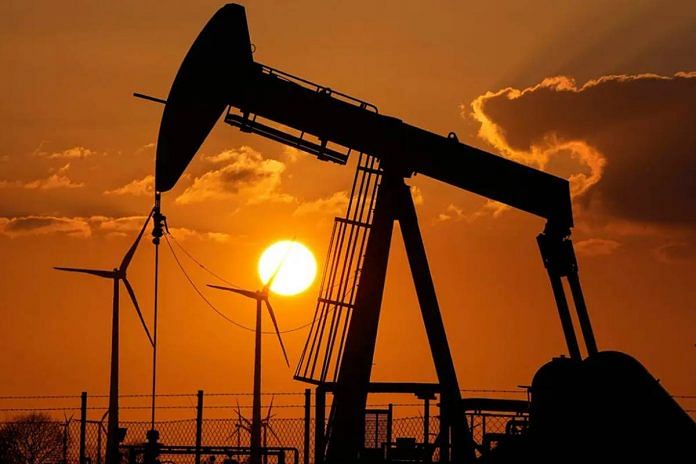New Delhi: Oil cartel OPEC+ made a surprise announcement Sunday that it plans to reduce crude oil production by 1.15 million barrels per day (mbpd), which is estimated to translate into a reduction of almost 1 per cent in daily global supplies.
The production cuts will begin in May and last until December 2023. The announcement sent global oil markets into flux with crude prices surging high. Brent crude jumped by 5 per cent early Monday, trading at nearly $84.
Experts ThePrint spoke to assess that India won’t be affected immediately but will be in the medium to long term, as it continues to purchase Russian Urals oil.
The global price of oil, even of the Indian basket — the metric India theoretically uses to set its fuel prices — has of late had little impact on the prices of petrol and diesel sold in the country. These haven’t changed since 22 May, 2022, despite substantial changes in the price of oil since then.
“The move came as a bit of a surprise. There was no real sense prior to the announcement that OPEC was mulling a production cut,” Anish De, global head for energy at KPMG, told ThePrint.
The Organization of Petroleum Exporting Countries (OPEC) is an alliance of 13 leading oil exporting countries led by Saudi Arabia and including Russia. OPEC+ includes 10 additional oil-exporting countries apart from the OPEC members.
It is the largest oil-producing group in the world, accounting for 40 per cent of the world’s crude oil production.
Also read: How fuel prices become mysteriously stable just before elections. Here’s data since 2020
‘Production cut meant to ensure preferred price range’
The cartel explained that the production cut was aimed at ensuring market stability. Saudi Arabia’s energy ministry described the move as a “precautionary measure” aimed at stabilising the oil market.
“The production cuts seem aimed to ensure crude prices remain within a certain range. This politically preferred price range is roughly between $80 and $100 a barrel for the OPEC+ countries. The effort seems to keep it around that,” said De.
The production cut also comes against assumptions that the oil-producing group would stick to cuts of 2 mbpd announced in October 2022, according to a Reuters report.
While the US has described the cut as “inadvisable”, reports suggest that it is a push by the group to increase oil prices amid fears of decreasing demand, with the aim of keeping prices close to $100 a barrel.
‘Impact on India will be felt in four to six months’
For India, the production cut has major implications as 85 per cent of the country’s crude imports are from OPEC countries, data from the Ministry of Petroleum and Natural Gas indicates.
“While global crude prices will shoot up in the short term, it will probably take longer for the price fluctuation and rise to affect India. The impact will be felt in four to six months,” Aditya Bhan, a fellow at the Observer Research Foundation, told ThePrint.
For India, there could be knock-on effects in the medium to long term, as crude prices go up as a consequence of the production cuts, an energy market analyst explained.
When the crude prices do go up in the medium term, it will affect India’s balance of payments, the analyst added.
Significantly, since Russia’s war with Ukraine began in February 2022, India started purchasing vast quantities of Russian Urals oil. According to reports, India was the highest purchaser of Urals as recently as January 2023.
“For India, the price of Russian Urals will probably go up in the medium term if the announced production cuts persist. We could see the increased prices in half a year,” said Bhan.
He, however, doesn’t see this as affecting India’s purchase of Russian oil.
“The purchase of Russian crude is here to stay in the medium to long term for India. Manufacturers have incurred expenditure to handle Urals oil in terms of re-orienting refining processes. This will make India persist with it,” he added.
(Edited by Nida Fatima Siddiqui)
Also read: Who in India is profiting from Russian oil? Not the common people but private companies



